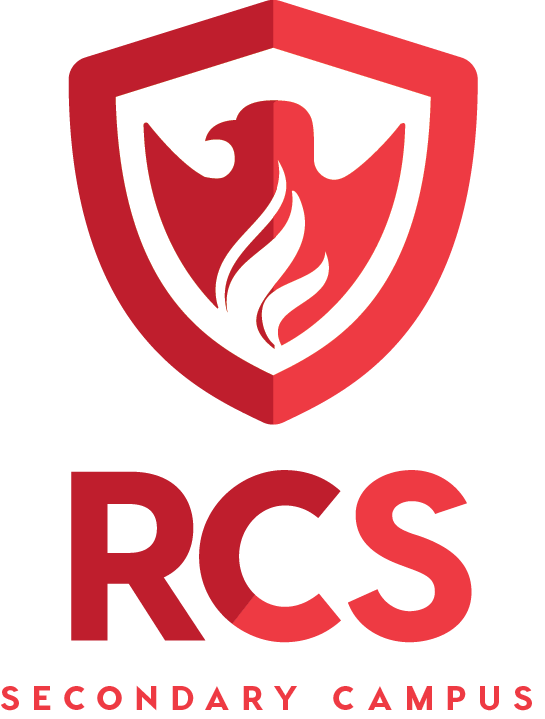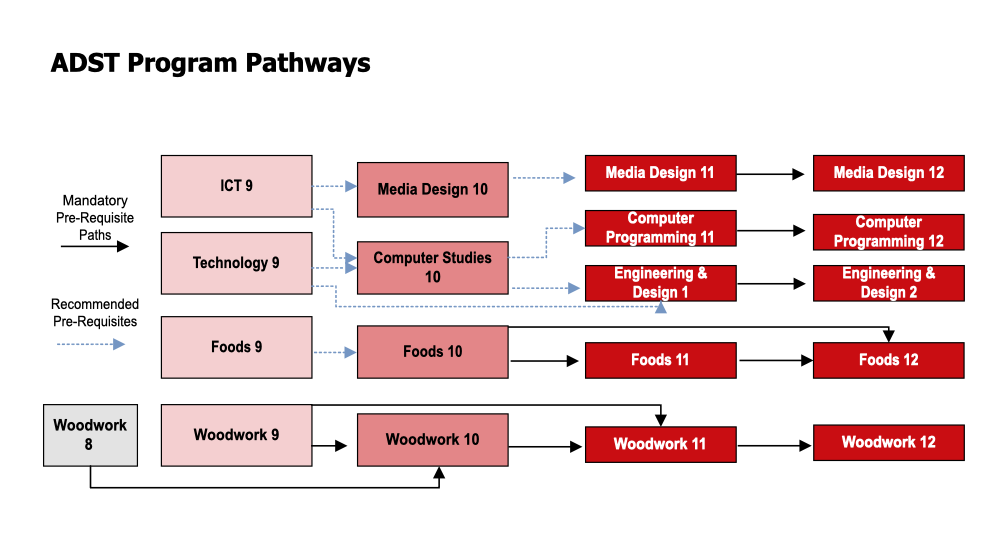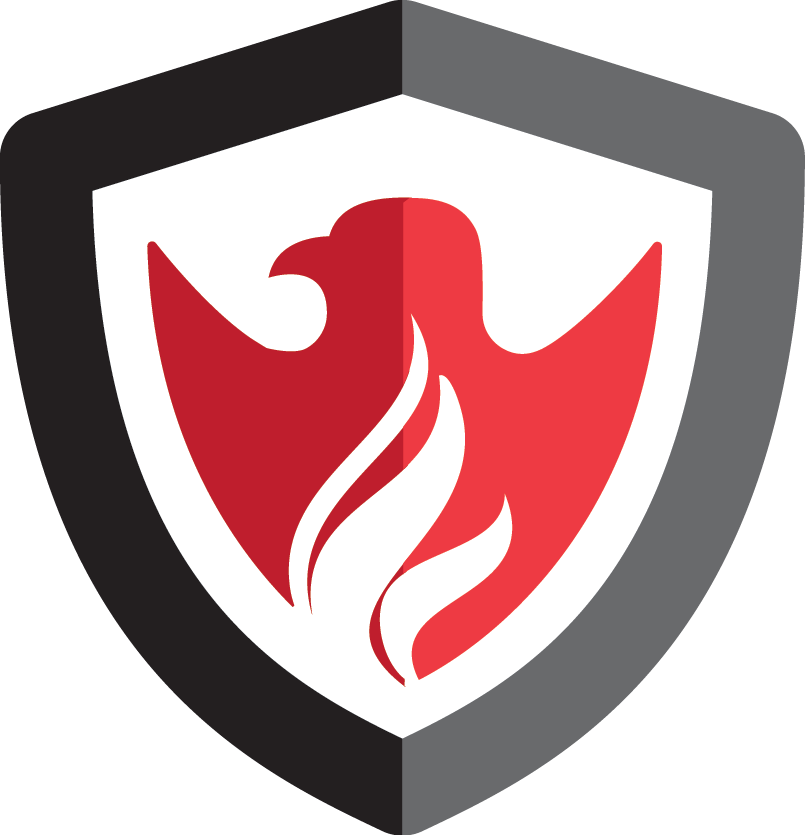
CURRICULUM & COURSE INFORMATION
ADST
MATH
ARTS
PHE
BIBLE
SCIENCE
CAREER
SOCIALS
ENGLISH
ESS
LANGUAGES
HOME
APPLIED DESIGN, SKILLS AND TECHNOLOGIES (ADST)
Applied Design, Skills, and Technologies (ADST) courses emphasize Design Thinking to nurture practical and creative skills in a Christ-centered environment. This approach encourages students to engage in hands-on learning, utilizing empathy, creativity, and critical thinking to innovate in areas like Business, Culinary Arts, Technology, and Media Design. Our curriculum, echoing BC’s focus on applied learning, equips students with the tools to confidently address real-world challenges and develop a growth mindset. Students engage in the Design Thinking Framework of defining, ideating, prototyping, testing, making, and sharing as a way to allow students to become skilled creative creators.
Graduation Requirements Statement
To graduate, students must take one full-year course (or two 2-quarter courses) of ADST and/or Arts Education in the Grade 10, 11 or 12 level.

CULINARY ARTS
Food Studies 9
Description: This is an introductory course, where students are introduced to the world of food and cooking. Students will become familiar with basic food and kitchen safety, and baking and cooking fundamentals. Students will begin to engage in the design process as they learn to develop their own unique baking flavours. Students will also be given the opportunity to bless others through the act of cooking and baking in the form of a service project.
Additional Information: Students will be required to occasionally supply some ingredients for self-selected recipes.Students will be required to occasionally cook or bake at home for various assignments. This course runs for 1 quarter.
Food Studies 10
Graduation Requirement: ADST and Arts Education 10, 11 or 12. Must take another 2-quarter course.
Description: This course delves deeper into the foundations of cooking and food related topics. Skills are built in cooking and baking techniques, meal planning, recipe design and development. Students will examine the relationship between eating practices and mental and physical wellbeing and will also growth in their understanding of Indigenous foods and methods of preparation. Students will be given the opportunity to research and present on a specific food trend and will choose a baking skill that they wish to develop further.
Additional Information: Students will be required to occasionally supply some ingredients for self-selected recipes.Students will be required to occasionally cook or bake at home for various assignments. This course runs for 2 quarters.
Food Studies 11
Prerequisite: Food Studies 10
Graduation Requirement: ADST and Arts Education 10, 11 or 12
Description: This course expands the students’ knowledge of food preparation techniques, ingredients and adaptations, and the skillful use of equipment. Collaboration and creativity are fostered, and the elements of the design process are integrated into cooking labs. Many cooking and baking methods are included, along with meal and recipe design opportunities, budgeting and marketing strategies, and food labelling and marketing. Food security issues are examined, and students complete a critical examination of food guides from around the globe, including Canada’s Food Guide and Canada’s Food Guide for First Nations, Inuit, and Métis.
Additional Information: Students will be required to occasionally supply some ingredients for self-selected recipes.Students will be required to occasionally cook or bake at home for various assignments. This course runs every other year, in rotation with Foods 12. The next rotation will be 2024-25.
Food Studies 12
Prerequisite: Food Studies 10
Graduation Requirement: ADST and Arts Education 10, 11 or 12
Description: This course expands the students’ knowledge of food preparation techniques, ingredients and adaptations, and the skillful use of equipment. Collaboration and creativity are fostered, and the elements of the design process are integrated into cooking labs. Multi-course meal development and preparation is a priority, and students develop the skills to adjust and develop recipes of their own. Complex cooking and baking methods are taught. Students explore food-related topics such as food justice, food policies and philosophies, and career opportunities. Students also develop important interpersonal and consultation skills for professional food production, and explore various careers opportunities in food related industries.
Additional Information: Students will be required to occasionally supply some ingredients for self-selected recipes.Students will be required to occasionally cook or bake at home for various assignments. This course runs every other year, in rotation with Foods 11. The next rotation will be 2025-26.
INFORMATION AND COMMUNICATION TECHNOLOGY
Information and Communication Technologies 9
Description: In this course, students will engage with the design thinking framework to innovate and create solutions to real-world problems. Throughout the course, students will develop their own applications using block coding and JavaScript, guided by the principles of design sprints to iteratively design, prototype, and test their ideas.
Additional Information: This course runs for 1 quarter.
Computer Studies 10
Graduation Requirement: ADST and Arts Education 10, 11 or 12. Must take another 2-quarter course.
Description: Students will learn basic computer programming in Python, and the impacts of technology use on personal health. Students will have opportunities to apply their newly acquired knowledge and skills to design, plan, and develop digital products such as apps and educational games.
Additional Information: This course runs for 2 quarters.
Computer Programming 11
Graduation Requirement: ADST and Arts Education 10, 11 or 12
Description: This course explores computer programming from a design perspective. Students have opportunities to deepen their understanding of the design process and learn how it is related to the software development cycle. Through working on projects, both individually and collaboratively, students study strategies to decompose problems, computational thinking processes, programming language constructs, ways to modify existing program code, and uses of pre-built libraries.
Computer Programming 12
Prerequisite: Computer Programming 11 or Outside programming course, demonstration of ability and permission from the teacher
Graduation Requirement: ADST and Arts Education
Description: This course explores computer programming from a game design perspective. Students expand on their coding knowledge, by learning C# coding and the game engine Unity. Students will continue to develop the computer programming, problem-solving, and collaboration skills acquired in Computer Programming 11. They will work on open-ended projects to study strategies to decompose complex problems, computational thinking processes, advanced programming language constructs, ways to modify existing program code, and uses of pre-built libraries.
Media Design 10
Graduation Requirement: ADST and Arts Education 10, 11 or 12. Must take another 2-quarter course.
Description: This course focuses on digital photography basics and graphic design. Students will have the opportunities to explore photo composition, digital image editing, and layout design in projects and use graphic design software to create various products.
Additional Information: This course runs for 2 quarters.
Media Design 11: Yearbook
Graduation Requirement: ADST and Arts Education 10, 11 or 12
Description: Media Design 11 is an innovative senior course that operates like a real-world workplace experience, including customer relations, conceptual work, collaboration, independent productivity, critical feedback, and meeting deadlines. These marketable skills are challenging for students but invest in their future employability. Concentrating on the intricacies and fundamentals of planning, designing, preparing and producing professional page layouts, the RCS yearbook is a historical record of the year and a personal portfolio. RCS graduates have used their published pages in their portfolios to apply to design programs and in job interviews that request work samples. Students will become proficient with digital media, software programs such as Photoshop, event photography, inter-personal research and communications, and composition principles.
Media Design 12: Yearbook
Prerequisite: Media Design 11
Graduation Requirement: ADST and Arts Education 10, 11 or 12
Description: Media Design 12 is an innovative senior course that operates like a real-world workplace experience, including customer relations, conceptual work, collaboration, independent productivity, critical feedback, and meeting deadlines. Students will take on leadership roles in managing the complexity of publishing a yearbook. Students will become highly proficient with digital media, software programs such as Photoshop, event photography, inter-personal research and communications, and composition principles.
TECHNOLOGY EDUCATION
Engineering and Design (Robotics) 1 (Coming for the 2025-26 school year)
Prerequisite: Grade 11 Standing
Graduation Requirement: ADST and Arts Education 10, 11 or 12
Description: In this course, students will be introduced to the foundational skills necessary for creating, coding, and operating robotics through a project and problem-based learning approach. Students will dive into the engineering design process, learning to identify problems, brainstorm solutions, and develop prototypes in a collaborative, hands-on environment. By engaging in this immersive experience, learners will acquire critical thinking and technical skills, preparing them for further exploration in the fields of engineering and technology. This course will also involve developing and prototyping using 3D printers to further expand the scope of student projects.
Technology 9
Description: Applied Design, Skills, and Technologies 9 (ADST 9) is an immersive course that guides students through the complete design process, from understanding contexts and defining opportunities to prototyping, testing, and sharing innovative solutions. Emphasizing critical thinking, creativity, and sustainability, learners will explore how to address real-world challenges by applying design thinking, collaborative work, and responsible technology use. This course fosters essential skills in research, ideation, material selection, and digital safety, encouraging students to consider social, ethical, and environmental impacts. By the end, students will not only create meaningful products but also critically reflect on their contributions to society and the environment, prepared to make informed decisions in our increasingly technological world.
Woodwork 9
Description: This course provides students with practical skills and knowledge in woodworking, fostering creativity, problem-solving, and craftsmanship. Students will become familiar with basic shop safety, including the safe operation of various hand tools and machinery like the band saw and power sander. Students will engage in the design process as they learn to develop their own unique style and preferences. Finally, students will be given the opportunity to bless others through the act of a service project.
Additional Information: This course runs for 1 quarter.
Woodwork 10
Prerequisite: Completion of Woodwork 8 or 9 (Inquire with the woodworking teacher if you’d like to request an exemption from these pre-requisite)
Graduation Requirement: ADST and Arts Education 10, 11 or 12. Must take another 2-quarter course.
Description: Students will explore key concepts in woodworking, including safety protocols, tool usage, material selection, and project design. Emphasis will be placed on developing a solid foundation in both hand tools and power tools, such as chisels, hand saws, measuring devices, band saw, drill press, planer, and jointer (among others). They will complete various projects throughout the 2 quarters as they gain confidence and efficiency in the woodworking shop.
Additional Information: This course runs for 2 quarters.
Woodwork 11
Prerequisite: Woodwork 9 or 10 (Inquire with the woodworking teacher if you’d like to request an exemption from these pre-requisite)
Graduation Requirement: ADST and Arts Education 10, 11 or 12
Description: This hands-on course offers students the opportunity to build upon their woodworking skills while fostering creativity and critical thinking. Students will integrate theoretical knowledge with practical application, encouraging them to understand the principles of woodworking and apply them in the creation of functional and aesthetically pleasing projects. Students will be given choice in their project selection and engage with various service projects throughout the year.
Woodwork 12
Prerequisite: Woodwork 11
Graduation Requirement: ADST and Arts Education 10, 11 or 12
Description: This hands-on course offers students the opportunity to build upon their woodworking skills while fostering creativity and critical thinking. Students will integrate theoretical knowledge with practical application, encouraging them to understand the principles of woodworking and apply them in the creation of functional and aesthetically pleasing projects. Students will be given choice in their project selection and engage with various service projects throughout the year. Upon completion, students will be prepared to consider further studies in woodworking, carpentry, design, and related fields.
